December 5
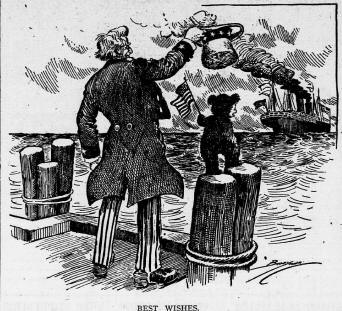 President Sails To Europe
President Sails To Europe
On Wednesday President Woodrow Wilson sailed for Europe to participate in the peace conference to be held in France.
As the George Washington swung out into the North River on a voyage unprecedented in American history, President and Mrs. Wilson stood on the flying bridge, the highest point to which passengers could climb. An Army band on the shores played ‘Over There.’
With the President waving his hat to cheering throngs aboard river craft, which crowded nearby waters, the George Washington turned her head towards the sea shortly after 10:30. As the big liner straightened her course, a presidential salute of 21 guns thundered from the liner’s guns, which during more than a year of war had served to defend
thousands of American soldiers from German submarine attacks.
With two destroyers in escort for the trip down the bay, the departure of the big liner was witnessed by a multitude of persons crowding in windows of homes, skyscrapers, and peers on both sides of the Hudson.
As the George Washington started down the bay a squadron of airplanes dropped from the clouds and executed a series of daring loops over the President’s ship. As the liner and its convoy steamed towards the sea, George Washington’s band played martial music and Allied merchant ships dipped flags and tooted whistles in salute of the departing
executive.
As the squadron passed through the gate in the submarine net, which stretches across the Narrows and within five hundred feet of Staten Island, a group of several hundred school children were transformed into a sea of waving flags while gunboats in the lower bay fired salvos in salute.
German Elections Set For February 16
The German Council of the People's Commissioners has fixed February 16 for elections to a constitutional assembly, conditional on the approval of the Soldiers’ and Workmen's Congress which meets December 16.
The empire will be divided into 38 electoral districts; from 6 to 16 seats will be allotted to each district, according to the population. The empire's territory as it existed before the war will be taken as a basis of division.
The Soldiers’ Council of Greater Berlin, at a stormy plenary session, expressed dissatisfaction with the appointment of an Executive Council of 28, by adopting a resolution appointing a committee, with representation from each of the seven regiments stationed in Berlin, to weigh charges against the Executive Council and if necessary, to reform the
organization.
The Soldiers Council of the Red Army Corps had formulated the charges, which declared, with other things that the Executive Council talked instead of acted. It was also declared that the executive had shamefully debased all high gains of the Councils; failed to effectively cooperate with the soldiers and other parts of Germany; failed to protect
the western border; and, hindered every orderly and political work.
Meanwhile, the Bavarian Premier explained that the breaking off of relations between Bavaria and the Berlin government was due to the fact that the German Foreign Office was a base of counter revolutionary movement, and that they would take no part in that. It is reported that Bavaria will open negotiations for separate peace with the Allies.
Yanks Resume March To Rhine
American troops continue to advance into Germany towards the armistice line. After their first nights sleep in Germany, the American troops of the Army of Occupation were ready at dawn to resume their march towards the Rhine. Advancing towards Coblenz the American forces are moving ahead astride the Mosselle River, traveling in a northeasterly
direction.
Once across the Rhine, the American Army will take up a line a little over 60 miles in length. It will describe an arc of a circle, having Coblenz as a center with a radius eighteen miles in length. This circle pivoting upon Coblenz is the bridgehead that the Germans conceded in the armistice. The front will extend a few miles beyond either end of
the semicircle described above, overlapping at places the lines of the British on the left and the French on the right.
The Americans expect to travel from seven to nine miles each marching day, with a day or two of rest at intervals. The commanders will decide upon the rest days as the advance continues. Much will depend on how the men and animals withstand the trip and the way the supply services keep up with the troops.
Three or four days will be required, it is estimated, for the four first-line divisions to complete their crossing into German territory. American divisions marched in full war gear: steel helmets, gas masks, rifles and belts filled with cartridges. The heavy artillery also rumbled along the German roads, while ammunition wagons kept step with the
troops. The main roads encountered during the first days marched into Germany were in good condition.
There were no flags or other decorations in any of the German towns through which the Americans marched, and no music except that furnished by the Americans. Wherever the Americans asked questions regarding roads they received courteous replies. In the restaurants and stores, Germans sold to the American soldiers any goods on hand at wartime
prices.
Plot To Restore Kaiser Revealed
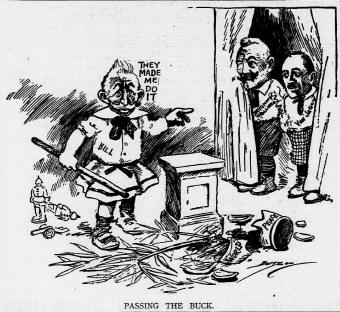 A plot to restore Emperor William has been discovered in Berlin. The chief men behind the plot are Field Marshal von Mackensen, Gen. Von Born, and Gen. Count Arnim. It is said that they instructed the Prussian Officers’ Corps to carry on
pro-Emperor agitation; beginning immediately after the demobilization of the troops was completed. Munitions makers have placed large sums of money at the disposal of the leaders.
A plot to restore Emperor William has been discovered in Berlin. The chief men behind the plot are Field Marshal von Mackensen, Gen. Von Born, and Gen. Count Arnim. It is said that they instructed the Prussian Officers’ Corps to carry on
pro-Emperor agitation; beginning immediately after the demobilization of the troops was completed. Munitions makers have placed large sums of money at the disposal of the leaders.
The plot collapsed when a Secret Service agent overheard a telephone conversation. Many arrests have been made in Berlin and other cities. No direct evidence of Kaiser Williams’ connection with the plot has been found, but it is believed that the outline of the plan was brought to Berlin by two of his aides, who recently went to the German capital
for the purposes of taking the wife of the former Emperor to Holland.
Field Marshal von Mackensen is reported to have attempted to induce Field Marshal von Hindenburg to join, but the latter refused, saying that he intended to retire after the demobilization of the Army. The whole Prussian court, it is reported, was in sympathy with the plotters, and it is said that the former Imperial Chancellor had promised to
help.
The plan was to organize a provisional government under Field Marshal von Mackensen and then urge the Kaiser to return. Field Marshal von Hindenburg, who placed the Army at its disposal, and refused to resign until a new government was elected, supports the current German government.
December 12
England Demands Trial Of Kaiser
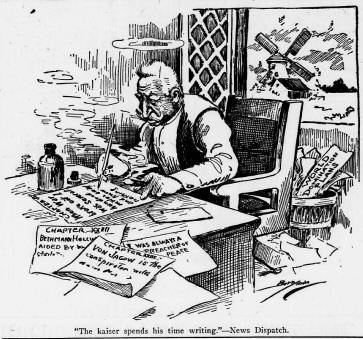 Premier Lloyd George called for the trial and punishment of the men responsible for the war, however high their place. He pledged the entire influence of the British government at the peace conference to see that justice was done.
Premier Lloyd George called for the trial and punishment of the men responsible for the war, however high their place. He pledged the entire influence of the British government at the peace conference to see that justice was done.
In his statement, the premier said: "the Kaiser must be prosecuted. The war was a crime. Who doubts that? It was a frightful, terrible crime! It was a crime in the way in which it was planned and in the deliberate wantonness with which it was provoked. It was a crime in the invasion of a helpless little state, and in the wicked and most brutal
treatment of that little state."
"Surely the war was a crime. The fact that all these horrible things were done in the name of war, under the imperial edict of an autocrat, does not change their nature. The war was a hideous, abominable crime - a crime which sent millions of the best young men of Europe to death and mutilation and has plunged myriads of homes into desolation."
"Is no one to be responsible? Is no one to be called to account? Is there to be no punishment? Surely that is neither God's justice nor man's. The men responsible for this outrage on the human race must not be let off because their heads were crowned when they perpetrated the deed."
All the European allies have accepted the principle that the Central Powers must pay the cost of the war up to the limits of their capacity. The Allies propose to appoint a committee of experts to examine the best methods of exacting the indemnity.
France And England Discuss Division Of Asia Minor
Reports from American sources indicate that there has been a recent exchange of notes between France and England concerning the partition of Asia Minor, both powers claiming Damascus and Aleppo.
According to the text published in Russia of a secret agreement made in the spring of 1914 between Russia, France, and England for the partition of Asia Minor, it accorded to England Mesopotamia and also the Syrian ports of Akka and Haifa, while it accorded to France a deep strip of the coast from Haifa to Adana, and extended inland clear to the
Armenian frontier.
The cities of Aleppo and Damascus fell in the French zone. The reason why England is now claiming these towns is unknown. Although rumors are ripe in London that Muslims are backwards people which can easily be controlled by a few soldiers.
Italy Readies For War With Yugoslavia
Friction between Italy and the newly organized Yugoslav state have reached such an acute stage within the last few days that it is causing concerns among Allied officials. So long as the differences merely related to territorial adjustments the dispute was limited to propaganda output and awaited adjustment at the peace conferences.
But the Yugoslav state is now protesting alleged oppressive measures of the Italian army of occupation in the territory along the eastern coast, and charged that the Italians are pushing their military control beyond the bounds set forth in the armistice.
Feelings are run high, and the fear is expressed that war will occur before the peace conferences reach the discussion of the disposal of territory along the East Adriatic coast, the question about which the differences revolve.
The presence of small detachments of American troops and American warships in the Adriatic is said to have a stabilizing effect upon the situation as all sides have declared respect for the American flag.
It is reported that Italian troops have torn down Serbian, Croatian, Slovenian flags and replaced them with the Italian flags. Italian troops are also charged was seizing food for their own use and various other oppressive measures.
December 19
Wilson Warmly Received In Europe
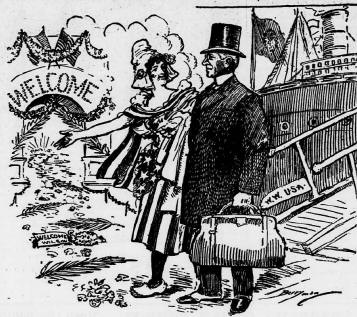 President Wilson reached the harbor of Brest on Friday afternoon on board the steamer George Washington. This is the first time an American President has stepped foot on European soil.
President Wilson reached the harbor of Brest on Friday afternoon on board the steamer George Washington. This is the first time an American President has stepped foot on European soil.
The arrival of the President in the harbor was the culmination of an imposing naval spectacle, which began as the Presidential fleet rounded the outer capes. It then moved majestically into the harbor, where the George Washington anchored at the head of a long double column of American battleships and destroyers.
This Presidential fleet was sighted at 11:30 in the morning, fifteen miles offshore. The sea was calm and the stately fleet moved landward under skies that steadily brightened after a dark and gloomy morning.
At the lead of the convoy was a single destroyer, showing the way to the fleet, close behind loomed the huge bulk of the battleships Pennsylvania and Wyoming, flying respectively the flags of the Commander of the Atlantic Fleet and the Commander of the American Naval Forces in European waters.
Behind them moved the George Washington bearing the President, flanked on either side by the battleships Arkansas, Florida, Utah, Nevada, Oklahoma, New York, Texas, and Arizona.
The entrance to the harbor is a narrow strait, a mile wide, with forts crowning the towering cliffs on each side. Through this avenue the imposing pageant moved, each of the ten forts contributing a cannonade which the American battleships returned gun for gun.
As the fleet neared the inner Harbor the local batteries and the assembled war craft took up the thunderous salute, while the piers, hills and the terraces of the old city rang with cheers from enthusiastic multitudes. At the same time all the war craft, merchantmen, and transports dressed ship and manned yardarms. The strains of the American
anthem floated over the waters, mingling with a roar of the guns and the shouts of the vast crowds.
The George Washington came to anchor a mile offshore, while the battleships arranged themselves in double columns on either side. President Wilson witnessed the spectacle from the deck of his ship, waving greetings and acknowledging the old world's first tribute to an American President.
There was another thundering cannonade as the President's launch left the George Washington and President Wilson came ashore, with Mrs. Wilson, who carried an American flag and a bouquet. He was escorted to the Tribune amid cheers and salvos and the notes of the Star-Spangled Banner.
Navy Ships To Return To Home Ports
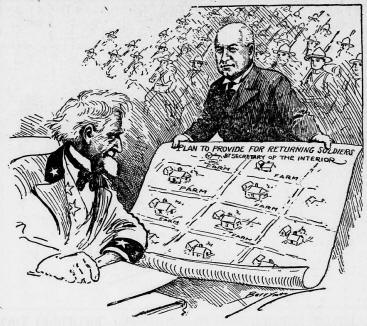 Every capital ship of the American Navy now in European waters, including the battleship squadrons, which have been operating with the British Main Fleet during the war, will return to home waters this month. They are expected to reach New
York about December 23rd where a naval review will take place to celebrate the homecoming.
Every capital ship of the American Navy now in European waters, including the battleship squadrons, which have been operating with the British Main Fleet during the war, will return to home waters this month. They are expected to reach New
York about December 23rd where a naval review will take place to celebrate the homecoming.
Instructions have been cabled to the Commander-In-Chief of the Atlantic Fleet, now at Brest, to bring back every vessel that can be spared.
The battleship division acted as the Sixth Battle Squadron in the British Grand Fleet. It won high praise from the British Admiralty for its efficiency and shared with the grand Fleet the acceptance of the surrender of the German High Sea’s Fleet.
Another battleship division under Adm. Rogers was stationed on the west coast of the British Isles to act as convoys against any surface crafts. On more than one occasion this division was called upon to cover the approach of important troop convoys, supplementing the destroyer force protecting against submarine attack.
Both divisions were mobilized on the French coast to meet the George Washington with President Wilson on board. The George Washington, which brought President Wilson to Europe, will join the battleships on their return voyage, taking 4,000 soldiers home.
It is assumed that much of the Atlantic Fleet, which has remained on this side, will be mobilized at New York to meet the ships that have shared in the crushing of German sea power.
Meanwhile, the demobilization of the Army is now proceeding at a rate of 15,000 men every day. It is anticipated, that this rate will increase within the next few weeks to 30,000 a day until all men no longer deemed necessary, will be returned to civilian status. The War Department has now discharged over 824,000 men.
President To Visit Troops
President Wilson is going to visit the American troops on December 24. General Pershing has arranged for the trip. Undoubtedly it will be the occasion for an important speech that will emphasize and delineate in the public mind the achievement of American forces.
While this is appreciated by the great mass of the French and British people, certain interest, which wants to make a different kind of peace from that which America understood when she announced her battle cry of making the world safe for democracy, has been trying to depreciate what has been done by the United States in the war.
President Wilson will travel Christmas Eve to the American General headquarters. From headquarters he will proceed to the American front, where he will have dinner with the American troops - not with General Pershing or other officers. Following Christmas Eve dinner, he will stay and visit with American troops. The President will be back in Paris
in the early days in January, for the opening of the peace Congress.
December 26
Wilson Calls For League Of Nations
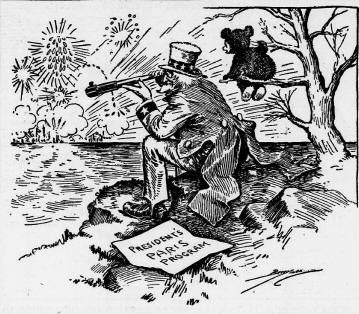 President Wilson has called for the formation of the League of Nations with the goal of preventing future wars. The formation of the League will be in three stages.
President Wilson has called for the formation of the League of Nations with the goal of preventing future wars. The formation of the League will be in three stages.
First, the Allied governments will decide the principles of such an organization, which will include compulsory arbitration and limitations of armaments. As a fundamental rule the League will call for the right of peoples to decide their own destinies. As a practical consequence it follows that there will be limitation of armaments and compulsory
arbitration among the nations.
The second act will consist of notifying the enemy powers of the fundamental principles laid down and require them to adhere to these principles. As to other conditions of peace, as in the case of stipulations of a territorial, financial and economic character, no discussion will be admitted.
Once the plenary areas are signed, details of the peace treaty will be discussed among the belligerence and only after the signing of this treaty will the third stage be reached. This will be a universal conference to settle the new relationships to be created between the peoples.
World Celebrates War Free Christmas
People around the world celebrated a historic Christmas like that of nearly 2,000 years ago, which marked peace on earth and good will towards men.
Once more the wise men of great nations are assembled to honor, not the person, but the principles of the Nazarene, whose spirits reign above Kings, Kaisers, and Czars and topple them from their thrones.
Families paid tribute to the homecoming of young men who fought that militarism might be crushed and freedom be reestablished among peace loving people. Many paid tribute to the latter-day martyrs who died so that those ideals may live.
Midnight masses in the Catholic churches, and every early morning services in the Protestant churches were heavily attended. Sermons struck the keynote of peace and expressed the hope that out of the peace conference might come a lasting peace to make this Christmas an epic one.